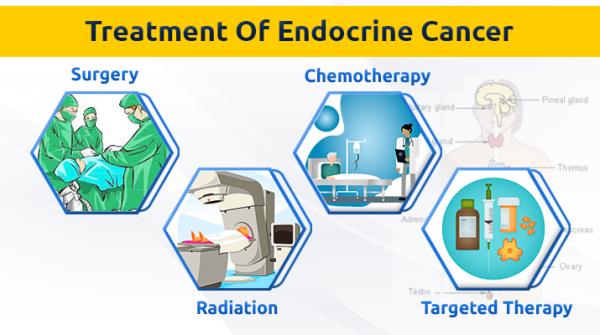What are the treatment options for endocrine cancer? | |||
 1,243 1,243  0 0  0 0 | |||
| Treatment for endocrine cancers depends on the specific type, stage, and location of the tumor, as well as the patient's overall health. Options include surgery to remove the tumor, radiation therapy to target cancer cells, hormone therapy to manipulate hormone levels and slow tumor growth, chemotherapy to kill cancer cells, targeted therapy using drugs that specifically attack cancer cells, and immunotherapy to stimulate the immune system to fight cancer. A combination of these treatments is often employed, and palliative care is crucial to manage symptoms and improve quality of life throughout the treatment process.
Treatment options for endocrine cancers vary greatly depending on the specific type of cancer (e.g., thyroid, parathyroid, adrenal, pituitary, pancreatic islet cell), its stage, the patient's overall health, and other factors. However, common treatment modalities include:
1. Surgery: This is often the first-line treatment for many endocrine cancers, aiming to remove the cancerous tumor and surrounding tissue. The extent of surgery varies depending on the location and size of the tumor.
2. Radiation Therapy: This uses high-energy radiation to kill cancer cells. It can be used:
Radiation therapy may be used before or after surgery, or as the primary treatment in certain situations. 3. Chemotherapy: This uses drugs to kill cancer cells. Chemotherapy is less frequently the first-line treatment for endocrine cancers compared to surgery and radiation, but it can be used alone or in combination with other therapies, especially for advanced or metastatic disease. 4. Targeted Therapy: These drugs target specific molecules involved in cancer cell growth and survival. Several targeted therapies are available for specific types of endocrine cancers, particularly advanced or metastatic disease. Examples include inhibitors of receptor tyrosine kinases (RTKs) and mTOR inhibitors. 5. Hormone Therapy: This involves using medications to block the production or action of hormones that stimulate cancer cell growth. This is particularly relevant for hormone-sensitive endocrine cancers like some types of thyroid and breast cancers (although breast cancer isn't strictly an endocrine cancer, it's frequently included in discussions due to hormonal influences). 6. Radioiodine Therapy (RAI): This is a specific type of radiation therapy used for certain types of thyroid cancer. The patient ingests radioactive iodine, which is absorbed by thyroid cells (both cancerous and normal), destroying them. 7. Peptide Receptor Radionuclide Therapy (PRRT): This targets neuroendocrine tumors that have receptors for specific peptides. A radioactive substance linked to a peptide is injected into the body, targeting and destroying the tumor cells. 8. Observation/Watchful Waiting: For some slow-growing, low-risk endocrine cancers, particularly in older individuals or those with significant comorbidities, close monitoring (observation) might be the preferred approach rather than immediate aggressive treatment. It's crucial to understand that this information is for general knowledge only. The specific treatment plan for an individual with endocrine cancer will be determined by their oncologist and endocrinologist based on a comprehensive evaluation of their condition. Patients should always consult with their healthcare providers to discuss their individual situation and develop a personalized treatment strategy.
Tags: Endocrine Cancer 내분비암 | |||
| |||
| | |||
|
 3350
3350 